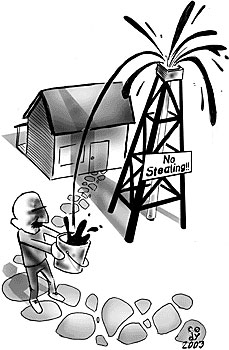
Illustration by Cody Angell
|
By Erik Flesch
Arizona Daily Wildcat
Tuesday May 6, 2003
Iraq's modern borders position the troubled nation squarely over the vast river basin of the Tigris and Euphrates, where millions of years have slowly metamorphosed buried organic matter into long, viscous hydrocarbon chains that slowly rise into convex rock traps deep under the region's impoverished inhabitants.
But because landowners since the 17th centuries hired the most innovative scientists of the day to identify and develop the useful qualities of the same crude oil found on American shores, this black gold has become one of civilization's most prized resources. And the world's second-largest proven reserves of it lie largely untapped beneath Iraq. But who owns it?
According to George W. Bush, the people of Iraq do. Who else, right? Wrong.
The rightful owners of the oil are the men and women who pay the tremendous costs of exploration to determine where to sink the wells, who negotiate and pay huge royalties to landowners, who organize the geologists, engineers, mechanics and laborers and pay them top-dollar to develop their idea ÷ in other words, the oil companies, without whom there would be no oil to profit from and fight over.
 |
|
|
Who owns America's oil? The landowner owns the mineral development rights, in most cases, if the land from which the oil is extracted was settled in the largely laissez-faire days before 1920 ÷ including during the time when the government granted vast tracts of land to settlers following the Homestead Act of 1862. These private landowners can enrich themselves by starting their own little oil company to extract and market the oil, or selling the patent to another oil company. Even in our mixed economy of today, a company that wishes to pay the exorbitant oil field exploration and development costs can negotiate a deal with the owner/overseer of the subsurface rights (whether that be an individual or government agency such as the Bureau of Land Management), and lease the patent from the U.S. government.
This private approach to ownership isn't simply an idiosyncratic American nationality concept or an expression of the race and gender of the founding fathers. No, it is a great ideal in action ÷ one whose roots took hold in the Enlightenment when scientists first identified the value of the free, rational human mind and philosophers vowed to defend intellectual freedom. This is the capitalist social system ÷ the system born of political liberty, founded on the principle of inalienable individual rights. Under capitalism, property is owned by individual men and women who can dispose of it or trade it according to their own conscience free from the initiation of force. They may not violate the rights or property of others, whether by theft or pollution, without suffering retaliatory force or other legal recourse.
How does liberty applied to the oil industry really affect individual human lives? In America, we have a song by Paul Henning that illustrates the point beautifully, performed on television, the free medium that replaced the witch-doctor, patriarch or government as keepers of oral tradition:
"Come 'n listen to my story Ībout a man named Jed,
A poor mountaineer, barely kept his family fed,
And then one day, he was shootin' at some food
And up through the ground come a bubblin' crude ÷
Oil, that is, black gold, Texas tea.
Well, the first thing you know, old Jed's a millionaire,
Kin folk said, Jed, move away from there,
Said, Californy is the place you oughta be,
So they loaded up the truck and they moved to Beverly ÷
Hills, that is, swimmin' pools, movie stars."
In outrageous contrast to this capitalist model stands Iraq's historical approach to oil rights. In the days following Saddam Hussein's coup, nationalized Western-industry-built oil wells greased the palms of the Ba'ath Party elite, financed repressive armed forces and powered sub-standard state-owned utilities. Before the 1972 nationalization, Western powers vied for rights to drill on land controlled first by warring sheiks under the Ottoman Empire, then a Western-allied monarchy, a nationalist coup leader and, finally, the Ba'ath Party itself. In each case, it was Iraq's government that benefited, while individuals suffered.
If Bush is indeed now interested in implementing liberty in Iraq, he will oversee the drafting of a constitution granting individual rights ÷ including property rights ÷ to the Iraqi people, whereby they can buy and sell all land freely and benefit individually from their own land's mineral wealth. Perpetuating a policy of collective land and mineral wealth ownership will only continue to fill the coffers of an authoritarian state, controlled by whichever tribe or religious mob happens to be most successful in intimidating voters.
What the Iraqi people need is for their oil resources not to be "democratized," but liberated. The United States must pave the way for oil companies to buy oil rights and pay royalties to land-owning Iraqi people ÷ not the Iraqi government.

